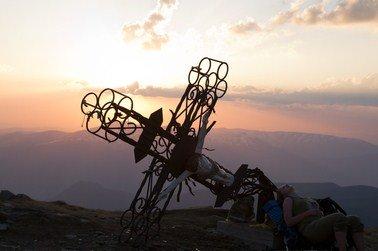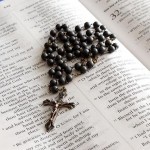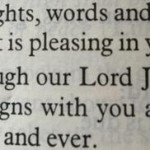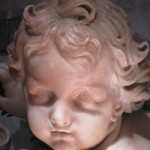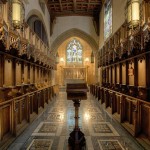Regardless of our religion — whether we are Catholics or Evangelicals or Jewish, Muslim, Hindu, Buddhist — the spiritual life challenges us to find balance. One of the reasons I was attracted to the Rule of Saint Benedict was because in ora et labora there is a prescription for balance. In the recitation of the Divine Office, we not only sanctify our time but we also set a pace for the whole day of prayer; work; prayer; work until — if we are good Benedictines (and I am not one) it all flows into a seamless whole.
Or, perhaps I mean hole, because it creates a gravity that is at once dense (because like a black hole, it draws all things into itself until they become part of the work, part of the prayer and therefore each event or moment is received without much surprise or drama) and light, because it is full of surrender, acquiescence; full of “yes.” The people you encounter, the problems that come your way, all become a part of that sanctified structure begun with the opening of a breviary with the words, “O Lord open my lips; and my mouth will proclaim your praise,” and everything that occurs thereafter is, strange but true, of a piece.
These pauses for prayer at distinct hours of the day are perspective-adjusters, and while one praying the Liturgy of the Hours will have a different method and ritual than, say, a Buddhist or a Jew, the God Balance is a constant. Rabia Chaudry’s thoughts on Muslim prayer times resonates because I recognize what she describes: “My slumber is broken five times daily through exhilarating ablution, and then heightened senses are tempered as forehead meets the floor.”
I do not pray my offices anywhere near enough, or regularly enough, I will testify that praying the Hours, even just one or two of them, makes a huge difference in the balance of a day; how I wear it, and how it wears me. Heightened senses are tempered, indeed. As with Rabia’s forehead, things become grounded.
Without balance, Christ Jesus and his teachings cannot be understood, because he is All Mercy, All Truth, All Wisdom and All Justice. When we overweigh any one aspect of those four we underweigh the other three; our perspective becomes unbalanced and our understanding disoriented. More importantly, we run the risk of pulling down the cross, altogether. As with the bronze serpent Moses raised high, that the viper-bitten might look upon it and be healed, we need the cross upheld — aloft, with the perfectly balanced Christ at its center — for the sake our our salvation and for others. To tug at the Mercy of Christ while ignoring his Justice, or to suggest that his Truth belongs to us while his Wisdom is never drawn near enough to pierce our hearts and minds, is to bring Christ crashing down to earth. We will look for his salvation and healing and will not find it, because it is then lost amid the herd of voices and tramping feet, all walking their own ways, seeking wisdom in the crowds, shouting their own truths; designing their own mercies, and deploying their own brands of justice.
This is how the faith is lost: through an imbalanced reception of Christ that brings Jesus and the Cross down to our levels — which are places of incomplete, unwhole (and often unholy) “truth” and “wisdom” and “mercy” and “justice” — leaving us nothing to which we can look for hope, and healing.
And nothing is the thing without God; the utter absence of Christ: All things came to be through him, and without him nothing came to be…
The constant reality of Christ is his holiness and wholeness and shot-through with the balance of his All-ness, Alpha and Omega; it is a reality to which we can be raised, through grace, via the royal pathway of obedience and a willingness to take to heart the very first word of the Rule of Benedict: Listen.
Over at OSV’s The Catholic Answer, I write about the utterly secure entity who is The God of All that is Balanced:
Genuine love looks upon what is beloved and loves it in its tempestuous totality of dark and light. The Creator who loved the world into being looked upon it — in its dark and light, its rushing waters and calming ponds, its winds and stillnesses, its chill and warmth — and loved every bit of it, pronouncing it “very good” (Gn 1:31).
Indeed, each of those are good things, all necessary in turn, but only alive in entirety, because they are balanced. A world with only light but no darkness could not sustain life; a world with only calm ponds and no moving waters to cleanse would soon grow stagnant and die; a world with no rushing winds would have pestilential air and little pollination; without calm, no growth. A world of unrelenting heat or chill? Not inhabitable. […] Perhaps when a God who is 100 percent love becomes an inaccessible notion to people…we might try teaching about a God Who is All Love by introducing them to the God Who is All Balance — who cannot help see the person before Him and see dark and light, squall and stillness, heat and cold, and call it “very good.” A balanced thing is “true,” and a Truth that calls us “good” is a Truth we want to know better.
You can read the whole thing, here
Fallen cross image courtesy of shutterstock.com

